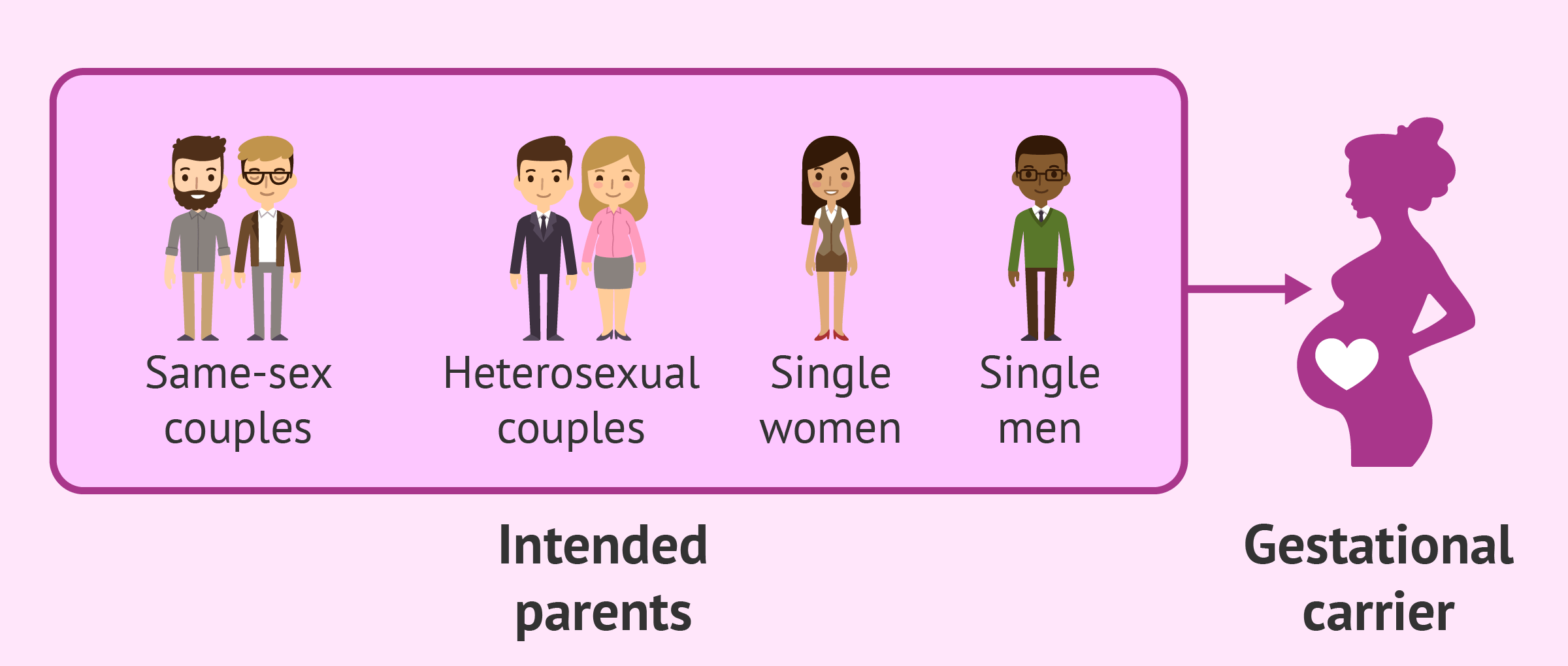Gestational carrier (surrogacy)
Gestational surrogacy is when a person carries and gives birth to a baby for another person or couple. It’s usually done through IVF (in vitro fertilization). The person who carries the pregnancy has no genetic relation to the baby. Most pregnancies carried by a gestational surrogate are achieved through in vitro fertilization (IVF). IVF is when an embryo is created in a lab using an egg and sperm from the intended parents or an egg and/or sperm donor. The embryo is then transferred to the carrier’s uterus. Because the gestational carrier doesn’t provide an egg, there’s no genetic connection between the carrier and the child.

Who Needs Gestational Carrier (Surrogacy)
Gestational carrier may be an option for individuals or couples who are unable to carry a pregnancy themselves due to various reasons, including:
- Women with medical conditions that prevent them from safely carrying a pregnancy, such as uterine abnormalities, recurrent pregnancy loss, or medical treatments that affect fertility.
- Same-sex male couples who wish to have a biological child.
- Individuals or couples with a high risk of passing on genetic disorders to their offspring.
- Individuals or couples who have undergone multiple unsuccessful fertility treatments.
When to See a Specialist:
If you are considering gestational carrier as an option to build your family, it is important to consult with a reproductive endocrinologist or fertility specialist who has experience in surrogacy. They can guide you through the process, discuss your options, and provide the necessary information and support.
Procedure
- Initial consultation: The intended parents meet with a fertility specialist to discuss their medical history, reasons for choosing surrogacy, and the overall process. The specialist will also evaluate their eligibility for surrogacy.
- Selection of a gestational carrier: The intended parents may choose a gestational carrier known to them, or they may work with a surrogacy agency or a matching service to find a suitable gestational carrier. Various factors, such as medical history, psychological evaluation, and legal considerations, are taken into account during the selection process.
- Medical evaluations: The intended parents and the gestational carrier undergo comprehensive medical evaluations, including blood tests, infectious disease screenings, and fertility assessments. The purpose is to ensure that both parties are healthy and have optimal conditions for a successful pregnancy.
- Legal agreements: Legal contracts are drafted to outline the rights, responsibilities, and expectations of all parties involved. These agreements cover aspects such as parental rights, financial arrangements, and potential risks.
- Synchronization of cycles: If necessary, the menstrual cycles of the gestational carrier and the intended mother (or egg donor) may need to be synchronized. This can be achieved through hormonal medications.
- Embryo transfer: The intended parents’ embryos are created through IVF using their own gametes or donor gametes. The embryos are then transferred to the gestational carrier’s uterus during a carefully timed procedure. Hormonal medications may be used to prepare the gestational carrier’s uterine lining for optimal embryo implantation.
- Pregnancy and prenatal care: The gestational carrier carries the pregnancy and receives regular prenatal care from her obstetrician. The intended parents may be involved in prenatal appointments and share in the joy of the pregnancy.
- Birth and legal proceedings: Once the baby is born, legal proceedings take place to establish the intended parents’ legal rights and parental status. This may involve legal documentation, such as birth certificates, parental orders, or adoption procedures, depending on the jurisdiction’s laws.
Road to Recovery
The recovery process for gestational carriers involves physical and emotional healing after the delivery. The gestational carrier will receive postpartum care from her healthcare provider, and the intended parents may provide emotional support and gratitude for her role in helping them achieve parenthood.
Risk Management
Gestational carrier (surrogacy) involves certain risks and considerations, including:
- Emotional and psychological challenges: Both the gestational carrier and the intended parents may experience a range of emotions throughout the process. Open and honest communication, counseling, and support are important for all parties involved.
- Legal complexities: Surrogacy laws vary by jurisdiction, and it is crucial to consult with legal professionals specializing in reproductive law to ensure compliance and protect the rights of all parties.
- Medical risks: Pregnancy and childbirth involve inherent risks, and the gestational carrier should have access to comprehensive prenatal care to monitor and manage any potential complications.
Benefits of Gestational Carrier (Surrogacy):
- Biological connection: Gestational carrier allows individuals or couples to have a biological connection to their child through the use of their own gametes or donor gametes.
- Parenthood opportunity: For individuals or couples who are unable to carry a pregnancy themselves, gestational carrier provides a pathway to parenthood.
- Control and involvement: Intended parents have control over the prenatal care and are involved in the pregnancy journey, including attending prenatal appointments and experiencing the birth of their child.
- Emotional fulfillment: Gestational carrier offers the opportunity for individuals or couples to experience the joy and fulfillment of having a child and growing their family.
Frequently Asked Questions
How much does gestational carrier (surrogacy) cost?
The cost of gestational carrier (surrogacy) can vary depending on factors such as location, legal fees, agency fees, medical expenses, and compensation for the gestational carrier. It is advisable to consult with a surrogacy agency or fertility specialist to understand the specific costs associated with the process.
Are there any age limitations for gestational carriers?
The age limitations for gestational carriers may vary depending on local regulations and the guidelines of fertility clinics or agencies. Generally, gestational carriers are typically between the ages of 21 and 45, with some variations based on individual health and medical assessments.
Can I use my own eggs with a gestational carrier?
Yes, it is possible to use your own eggs with a gestational carrier. However, this depends on your individual circumstances and fertility evaluation. If using your own eggs is not an option, you may consider using donor eggs.
What are the legal aspects involved in gestational carrier (surrogacy)?
The legal aspects of gestational carrier (surrogacy) can be complex and vary by jurisdiction. It is essential to work with experienced legal professionals specializing in reproductive law to navigate the legal processes, draft comprehensive agreements, and ensure all parties’ rights and responsibilities are protected.
How long does the gestational carrier (surrogacy) process typically take?
The gestational carrier (surrogacy) process can vary in duration. It involves multiple stages, including finding a suitable gestational carrier, medical evaluations, legal proceedings, and the IVF process. On average, the process can take around 12 to 18 months, but it can be shorter or longer depending on individual circumstances.
Treatians As The Best Choice
Treatians understand that seeking medical treatment abroad can be a daunting experience for patients and their families. That’s why the company offers end-to-end support to its clients, from the initial consultation to post-treatment care. The company provides personalized treatment plans that are tailored to meet the individual needs of each patient, and its team of dedicated professionals is always on hand to provide guidance and support throughout the entire process. Contact us at +91-7982312582, drop your email [email protected]
- Trauma & intensive care
- Aged Care
- Community Services
- Diagnosis & Investigation
- Medical & Surgical
- Mental Health
- Rehabitation
- Specialised Support Service















